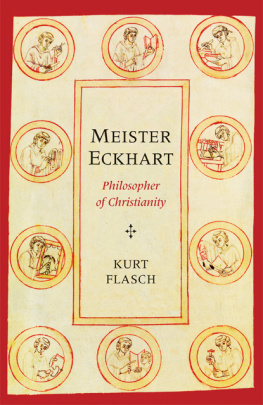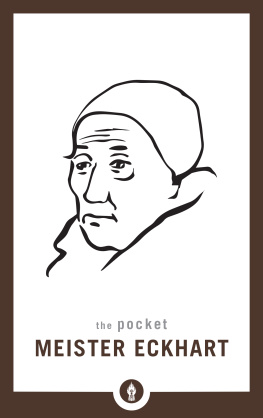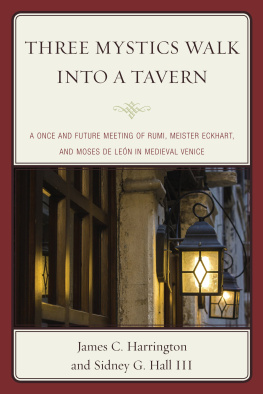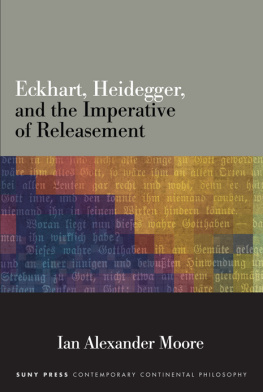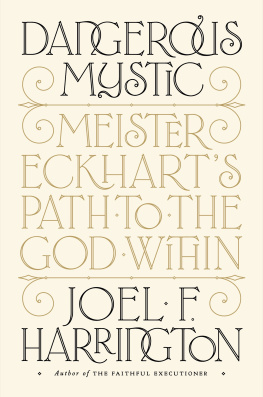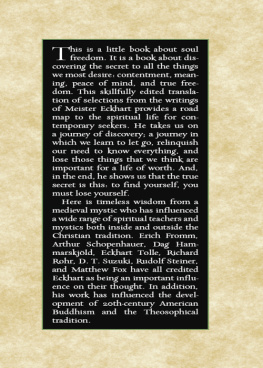Flasch - Meister Eckhart
Here you can read online Flasch - Meister Eckhart full text of the book (entire story) in english for free. Download pdf and epub, get meaning, cover and reviews about this ebook. publisher: Yale University Press, genre: Religion. Description of the work, (preface) as well as reviews are available. Best literature library LitArk.com created for fans of good reading and offers a wide selection of genres:
Romance novel
Science fiction
Adventure
Detective
Science
History
Home and family
Prose
Art
Politics
Computer
Non-fiction
Religion
Business
Children
Humor
Choose a favorite category and find really read worthwhile books. Enjoy immersion in the world of imagination, feel the emotions of the characters or learn something new for yourself, make an fascinating discovery.
Meister Eckhart: summary, description and annotation
We offer to read an annotation, description, summary or preface (depends on what the author of the book "Meister Eckhart" wrote himself). If you haven't found the necessary information about the book — write in the comments, we will try to find it.
Meister Eckhart — read online for free the complete book (whole text) full work
Below is the text of the book, divided by pages. System saving the place of the last page read, allows you to conveniently read the book "Meister Eckhart" online for free, without having to search again every time where you left off. Put a bookmark, and you can go to the page where you finished reading at any time.
Font size:
Interval:
Bookmark:


The translation of this work was funded by Geisteswissenschaften InternationalTranslation Funding for Humanities and Social Sciences from Germany, a joint initiative of the Fritz Thyssen Foundation, the German Federal Foreign Office, the collecting society VG WORT, and the Brsenverein des Deutschen Buchhandels (German Publishers & Booksellers Association).
Published with assistance from the Ronald and Betty Miller Turner Publication Fund.
Published with assistance from the Mary Cady Tew Memorial Fund.
English translation copyright 2015 by Yale University. Translated 2015 by Anne Schindel and Aaron Vanides.
All rights reserved. This book may not be reproduced, in whole or in part, including illustrations, in any form (beyond that copying permitted by Sections 107 and 108 of the U.S. Copyright Law and except by reviewers for the public press), without written permission from the publishers.
Originally published as Meister Eckhart: Philosoph des Christentums, 3rd ed. Copyright Verlag C.H. Beck oHG, Mnchen 2011.
Yale University Press books may be purchased in quantity for educational, business, or promotional use. For information, please e-mail (U.K. office).
Set in Fournier type by IDS Infotech, Ltd.
Printed in the United States of America.
ISBN: 978-0-300-20486-5 (cloth; alk. paper)
Library of Congress Control Number: 2015943082
A catalogue record for this book is available from the British Library.
This paper meets the requirements of ANSI/NISO Z39.481992 (Permanence of Paper).
10 9 8 7 6 5 4 3 2 1
For
Maria Antonietta Terzoli
November 27, 2009
One must speak wholly differently of the grounds of being of things and the knowledge of them, differently also of the things outside in nature. Likewise, it is to be spoken differently of substance and differently of accident. Those who fail to consider this will often fall into error.
Meister Eckhart, In Ioh., LW 3, n. 514, 445
All things, or almost all, that we ask about God are easily solved. And what is written about Godoften also the obscure and difficult thingsis explained clearly through natural reason.
Meister Eckhart, Prologus generalis, LW 1, n. 2, 39.34
Everything that is written or taught about the blessed Trinity is not necessarily so or true.
Meister Eckhart, Latin sermon 4, LW 4, n. 1, 31
It is a kinship of the divine kind. It is one within itself. It does not have anything in common with anything. In this matter, many a great scholar stumbles.
Meister Eckhart, German sermon 28, DW 2, n. 66, 45
If only they understood what mind is.
Meister Eckhart, DW 4, n. 1, 652.211, stating his reason for rejecting all the theologians of his time
We are concerned here with a thinker who presentsgranted, at times more casually than we are accustomed to demandthoughts, not impressions, and strives to prove them by a strict method. He would believe that he was merely treading water if he were to keep his sentences unexplained and unproven.
Adolf Lasson, Meister Eckhart: Der Mystiker (Berlin, 1868), 3
Contents
Interlude: Writing about Eckhart Today
Translators Preface
Every act of translation requires negotiation and compromise, especially with two translators collaborating on the same text. We agreed from the outset that we wanted to re-create as closely as possible the experience of reading the German original. Both of us are fluent in English and German, but both of us are also native speakers of just one language. We naturally disagreed about nuances of tone and style in the original and the translation, though we were in agreement about the content and the direction of the argument. Kurt Flaschs style is unique, subtle, and careful: how he says something is nearly as important as what he says. It is in terms of the how that we had to make compromises. A subtlety in the German that one of us found important could not always be re-created without introducing alienating diction into the English version, and we therefore decided to retain Flaschs idiosyncrasies only where the German is equally peculiar.
A few of these idiosyncrasies merit special mention. Flaschs style oscillates between the formal and the conversational and is aimed at a learned and curious general audience, not just specialists. At times his tone may border on the irreverent, and Flasch delights in wordplay and vivid images, some of them taken from German daily life. In our translation we have attempted to keep the text equally whimsical.
Flaschs style also relies on a flexible terminology: the same philosophical concepts are often presented with German synonyms. We have collapsed some of these synonyms to make the text more readable in English, but without sacrificing variation completely. In this context our use term being deserves a special note. It represents the German terms Wesen, Sein, and Seiendes to avoid unnecessary complications. We have followed Flasch more closely in his use of compounds by breaking them apart and translating each part literally wherever possible. Flasch often eschews Latinisms in favor of words with Germanic roots to avoid the impression of loftiness and mysticism attached to many modern interpretations of Eckhart. Latinate words have a more elevated sense in German than they do in English, but we have also tended to avoid Latinisms where possiblewith the caveat that they were sometimes inevitable. Readers familiar with Eckhart scholarship will therefore encounter certain terms that seem new or different from those to which they are accustomed.
Finally, two typographical decisions deserve mention. First, Kurt Flasch repeatedly uses colons to connect main clauses. We have kept this important facet of his style to preserve the authors unique voice. Second, we have chosen to capitalize certain nouns, such as Oneness, Wisdom, and Justice, when they refer to the primary determinations. The precise relationship between these primary determinations and their existence in specific entities is developed throughout Flaschs reading of Eckhart, but those who wish to acquaint themselves with the distinction between Wisdom and wisdom, for example, can refer to Flaschs discussion of the prologues to the Opus Tripartitum on pages 77 to 82 for a preliminary explanation.
We are indebted to our copyeditor Kip Keller and the anonymous reader for their attentive reading of the manuscript. They offered many suggestions for improvement, prevented us from introducing inconsistencies, and caught various typos. Their invaluable comments helped us wade through and rethink many thorny issues, and both their eye for detail and their deep understanding of the content helped us improve the text at several stages.
Preface
Meister Eckhart attracts. His radical thinking and the force of his words still fascinate us. We are moved by his tragic fate: his death in Avignon, his trial, his condemnation by the church. And then there is his immense impact: from Henry Suso to Nicholas of Cusa, from Hegel to Heidegger, from Robert Musil to Paul Celan. And beyond.
His image has fluctuated throughout history. Studies from the past few decades have changed it. This book attempts to take stock.
It is an introduction to his thinking. It is an invitation to read Eckhart and to think along with his propositions without divorcing him from the historical world from which he came and against which he positioned himself. I have tried to do this as transparently, as verifiably, and as succinctly as possible. A more comprehensive account would have gone beyond the intended scope of this work.
Next pageFont size:
Interval:
Bookmark:
Similar books «Meister Eckhart»
Look at similar books to Meister Eckhart. We have selected literature similar in name and meaning in the hope of providing readers with more options to find new, interesting, not yet read works.
Discussion, reviews of the book Meister Eckhart and just readers' own opinions. Leave your comments, write what you think about the work, its meaning or the main characters. Specify what exactly you liked and what you didn't like, and why you think so.

